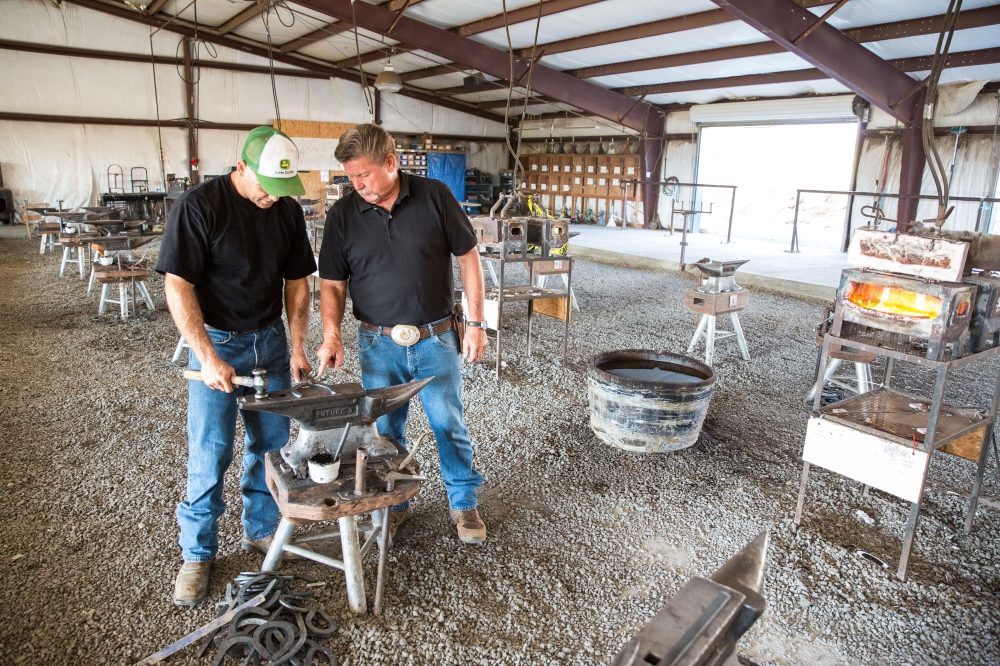As Pacific Coast Horseshoeing School awaits its court date challenging California’s vocational admission laws, it and other private educational institutions scored a victory in their fight with the state over United States military veterans’ benefits.
The U.S. Department of Veterans Affairs (VA) is suspending California State Approving Agency for Veterans Education’s (CSAAVE) authority to approve programs for GI Bill benefits, according to letters distributed by the VA to educators.
“In accordance with federal law, VA will assume program approval authority in the absence of an agreement with California,” according to the letter. “The department is prepared to assume those duties.”
Chairman Bogue, executive director of the Education Service, which oversees the GI Bill, told the California veterans agency in a letter that it “has significantly declined to an unacceptable level, impacting the trust of Veterans in the GI Bill approval process.” The VA’s move comes after CSAAVE “erroneously” suspended some public institutions, failed to complete required audits, refused to approve programs on military bases, and failed to identify and take action against deceptive advertising practices.
CSAAVE is challenging the VA’s decision, claiming that its authority stands.
“CSAAVE retains its authority for approval of institutions and programs,” according to a letter attributed to the agency’s Latanaya Johnson. “This also means CSAAVE’s approval process will not change.”
The VA is not backing down.
“VA is aware that CSAAVE sent a letter to California schools ... stating that CSAAVE will retain its authority to approve programs for GI Bill benefits,” according to a letter sent to schools. “VA does not agree with CSAAVE’s assertion and will assume the role of the State Approving Agency for the state of California on October 1, 2019, and CSAAVE will lose its authority on the same day.”
Some institutions that were suspended by the state from accepting GI Bill reimbursement have filed lawsuits to fight the decision. Others, such as Pacific Coast Horseshoeing School in Plymouth, Calif., were forced to drop the benefit altogether because of onerous requirements.
“CSAAVE started to include so many costs and regulations that privately-owned schools could not comply,” Bob Smith, owner of Pacific Coast Horseshoeing School (PCHS), told American Farriers Journal. “They were forcing veterans into public colleges as the only way they could use their veterans benefits.”
PCHS was initially suspended from accepting the GI Bill but was reinstated in late 2018 with significantly more requirements to fulfill.
“I asked them if this was a nationwide revision of the approval,” says the 2010 inductee of the International Horseshoeing Hall of Fame. “I was told that it was specifically a California requirement. Other horseshoeing schools in other states do not have to submit the information that California is requiring.”
Among the requirements are:
• All students must “answer any and all questions from the state of California and/or Pacific Horseshoeing School, Inc., regarding myself.”
• All students must sign, “I certify that I will submit copies of my business license, fictitious business name statements, advertising, website information, business receipts evidencing income, within 60 days of graduation.”
• Schools must present a full certified public accountant (CPA) audit each year. It must comply with the U.S. Department of Education’s (USDE) requirements despite the USDE not having jurisdiction over PCHS. A CPA audit costs an estimated $4,500.
• Schools must maintain a log of phone calls to and from the veteran, as well as copies of emails or letters from the school to every student, regardless of military service.
• Schools must annually submit information detailing the veteran’s income in $5,000 increments and the supporting evidence to prove their statements.
• The veteran must be working full-time (32 hours or more a week) within 60 days of graduation.
“It’s a systemic, intentional process of closing small schools through suffocation from piles of regulations,” Smith says.
PCHS’ ability to accept the GI Bill is important for many veterans, particularly for those who suffer from post-traumatic stress disorder (PTSD). PCHS enrolls an average of about 10 veterans a year.
“I get a lot of PTSD vets who just can’t take working inside, and/or working with the same people every day,” says Smith, who served in the Vietnam War from 1968-69. “Working outside, with horses, and being in charge of your own life is cathartic for many, particularly veterans with PTSD.”
Smith is no stranger to challenging the state’s regulations. Oral arguments are scheduled for Thursday, Oct. 24, 2019, in PCHS’ federal lawsuit that challenges the constitutionality of California’s vocational admission laws.
Smith filed the lawsuit after the state threatened to shut down PCHS if he officially or unofficially taught Esteban Narez because he does not have a high school diploma. Section 94904(a) of the 2009 California Private Postsecondary Education Act requires that all students attain a high school degree, GED or pass a U.S. government-approved exam before entering a private trade or vocational school.
While California educators say that those who don’t possess basic skills have a greater risk of dropping out of school, Smith argues that it turns a blind eye toward those who do not graduate but still wish to contribute to society.
“There are more than 52,000 kids a year who don’t get high school diplomas in California,” he says. “What do you do with those kids? There are so many things — learning disability, incarceration, etc. — that have occurred in their younger lives and prevented them from getting a high school diploma. Now the state is telling them they cannot invest in themselves.”
The law was intended to thwart what is referred to as “diploma mills” — schools that prey upon under-qualified students by issuing bogus credentials after saddling them with a large student loan debt.
Although the law is modeled after a federal law regulating student loans, California goes further. The U.S. government traditionally screens students who apply for federally funded loans to ensure the material being taught can be understood and learned. However, federal law does not restrict trade or vocational schools from accepting students who pay for their tuition. California, on the other hand, applies its law to all schools regardless of whether they accept student loans. PCHS does not accept student loans.
“For students with limited education, this law is the biggest obstacle to their success,” Smith says. “I’m outraged that the state of California is deciding which kid is a winner and which kid is a loser.”








